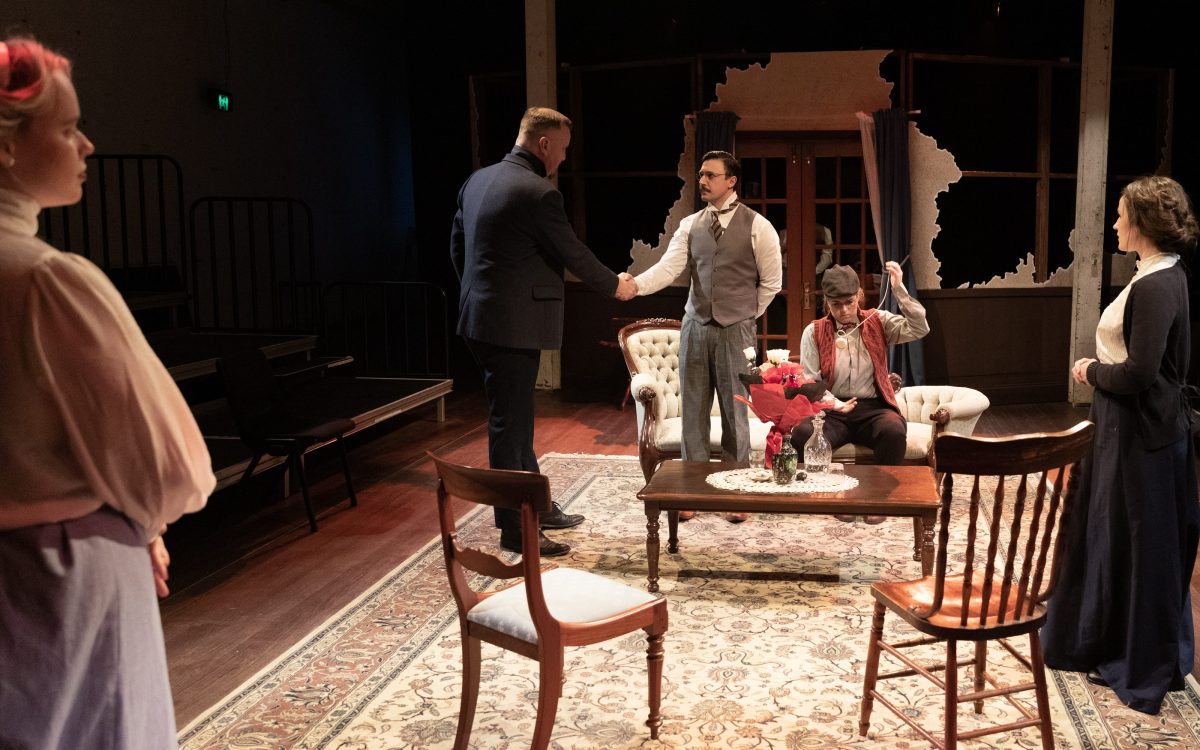Despite its reputation as one of James Joyce’s less well-received works, Bloomsday in Melbourne’s abridged adaptation of Exiles is a compelling and nuanced production.
Known for his modernist avant-garde novels, Exiles is Joyce’s only drama – a fascinating exploration of fidelity, monogamy and disentangling their conflation within the institutional confines of marriage.
Showing until 25 June, the basement theatre-space at fortyfivedownstairs provides an intimate setting for grappling with the play’s contentious themes. Audience members are seated in traverse, with the performance unfolding in between. This triangular arrangement mirrors the play’s central tryst involving Richard (Doug Lyons), his wife Bertha (Lucy Payne), and best friend Robert (Soren Jensen). Unbeknownst to Robert, Bertha has been telling Richard everything about his friend’s covert advances towards her. Shared jealousy mediates their mimetic desire for Bertha and strengthens their bond, creating a thinly veiled undercurrent of homosocial desire throughout the play.
Although monogamy is the dominant expression of fidelity in our culture, it can also be practised in alternative relationship structures, such as an open marriage. The Latin etymology of ‘fidelity’ holds a dual meaning of being not only faithful to another, but also true to oneself. It is after all, not only the secrets you keep from your lover, but the secrets you keep from yourself that condemn you.
Although it appears that Richard’s love for Bertha makes him an advocate for her desires to be fully liberated and unhindered by him (‘to hold you by no bonds, even of love’), Bertha does not seem to reciprocate Robert’s feelings for her. She only plays along and accepts Robert’s affection as if to appease Richard’s fantasies of being cuckolded. Bertha interprets Richard’s gift of freedom as proof he does not love her and wants to be with other women, instead of receiving his gift as a sign that he truly does love her.
Infidelity in Exiles does not stem from having an affair but in concealing one’s true desires and intentions. Can adultery be considered infidelity when one is completely transparent about it?
The minimalism of the set, with transparent doors on either side of the stage, create a heightened anxiety. There is the sense that at any given moment, two characters sharing a fleeting moment of intimacy could be interrupted from either side – they are always in the middle of something, so to speak. Shared dialogue gestures towards an invisible, omnipresent third.
Read: Performance review: Break, Metro Arts, Brisbane
Richard’s belief that ‘while you have a thing, it can be taken from you. But when you give it… no robber can take it from you. It is yours then forever, when you have given it,’ seems to contradict the experimental purpose of polyamory. Does loving two people at the same time negate your love for both? Does your love split in half, or does it multiply? Is love something scarce or abundant? It is perhaps easier to give a thing than it is to give oneself?
If you can give a thing but can not give oneself, you can only access oneself through your desire for the thing. As Beatrice Justice (Mary Agnes-O’Loughlin) declares early on in the play, ‘it is a terribly hard thing to do, to give oneself wholly and freely’. It is a shame her character, as Richard’s former and lingering lover, is underwritten and given less attention than the other characters. The play is more coloured by the patriarchal concerns of its two male leads and the ubiquitous male gaze that governs its political scope, including the objectification of Bertha in a competition of masculine virility.
Exiles ask its audience if one can love without the impulse to possess, and creates enough space for an assortment of answers.
Exiles by James Joyce
Bloomsday in Melbourne
fortyfivedownstairs
Director: Carl Whiteside
Cast: Doug Lyons (Richard Rowan), Lucy Payne (Bertha), Soren Jensen (Robert Hand), Mary-Agnes O’Loughlin (Beatric Justice), Linda Cookson (Brigid), and Caitlin O’Loghlen (Archie)
Set and Costume Designer: Bridie Turner
Lighting Designer: Lindon Blakely
Stage Manager: Gin Rosse
Assistant Stage Manager: Ellie Brindle
Tickets: $38-45
Exiles will be performed until 25 June 2023.
This article is published under the Amplify Collective, an initiative supported by The Walkley Foundation and made possible through funding from the Meta Australian News Fund.





